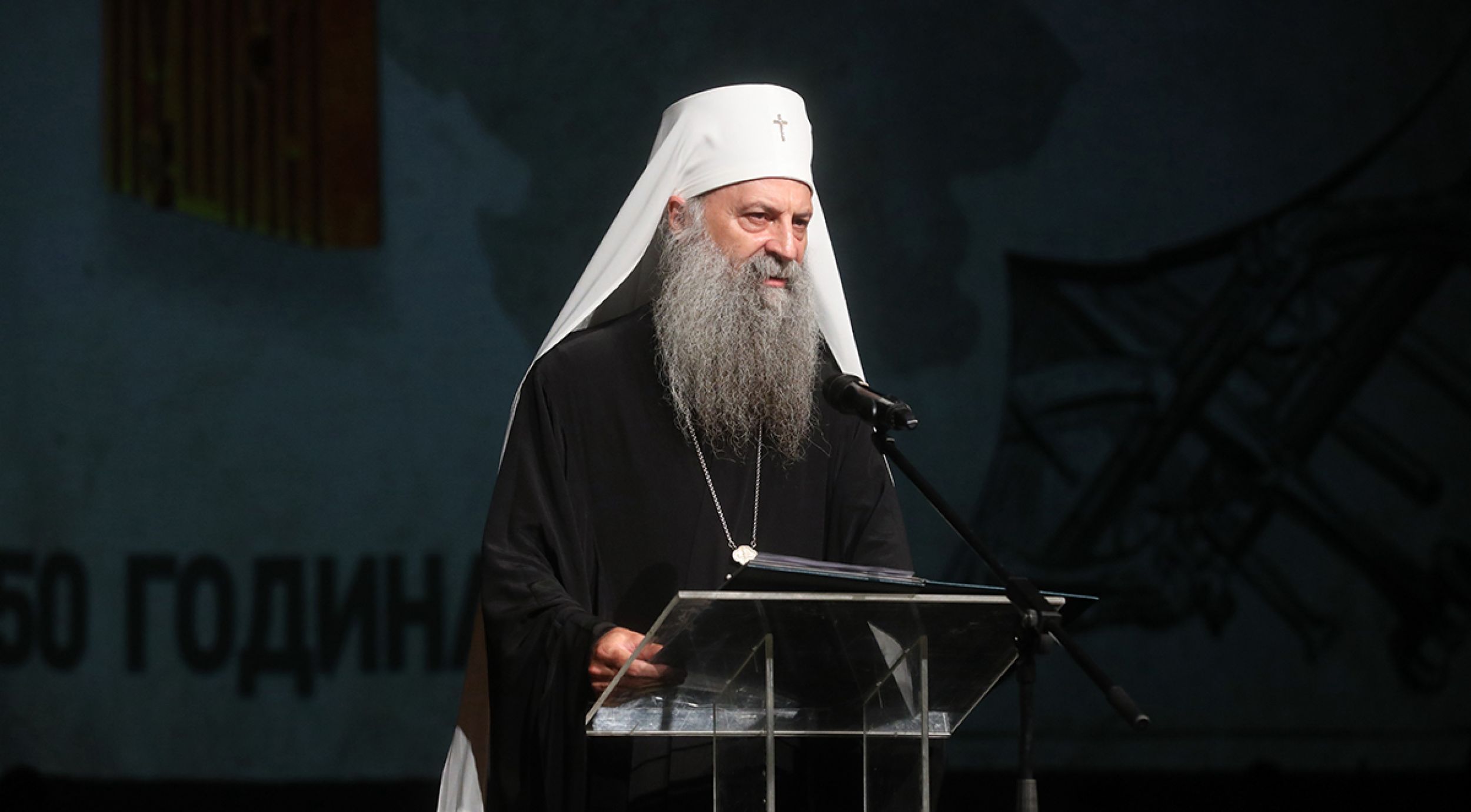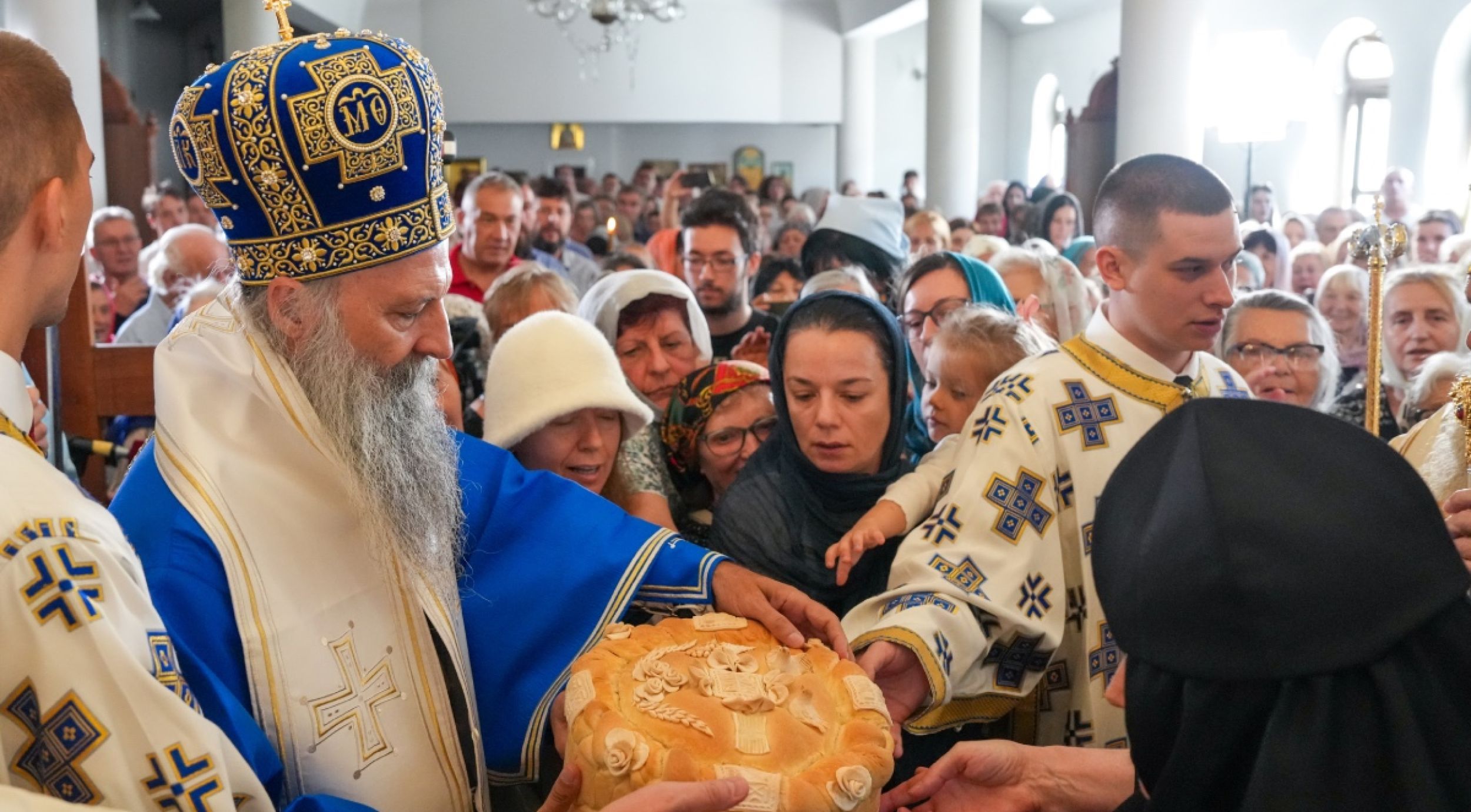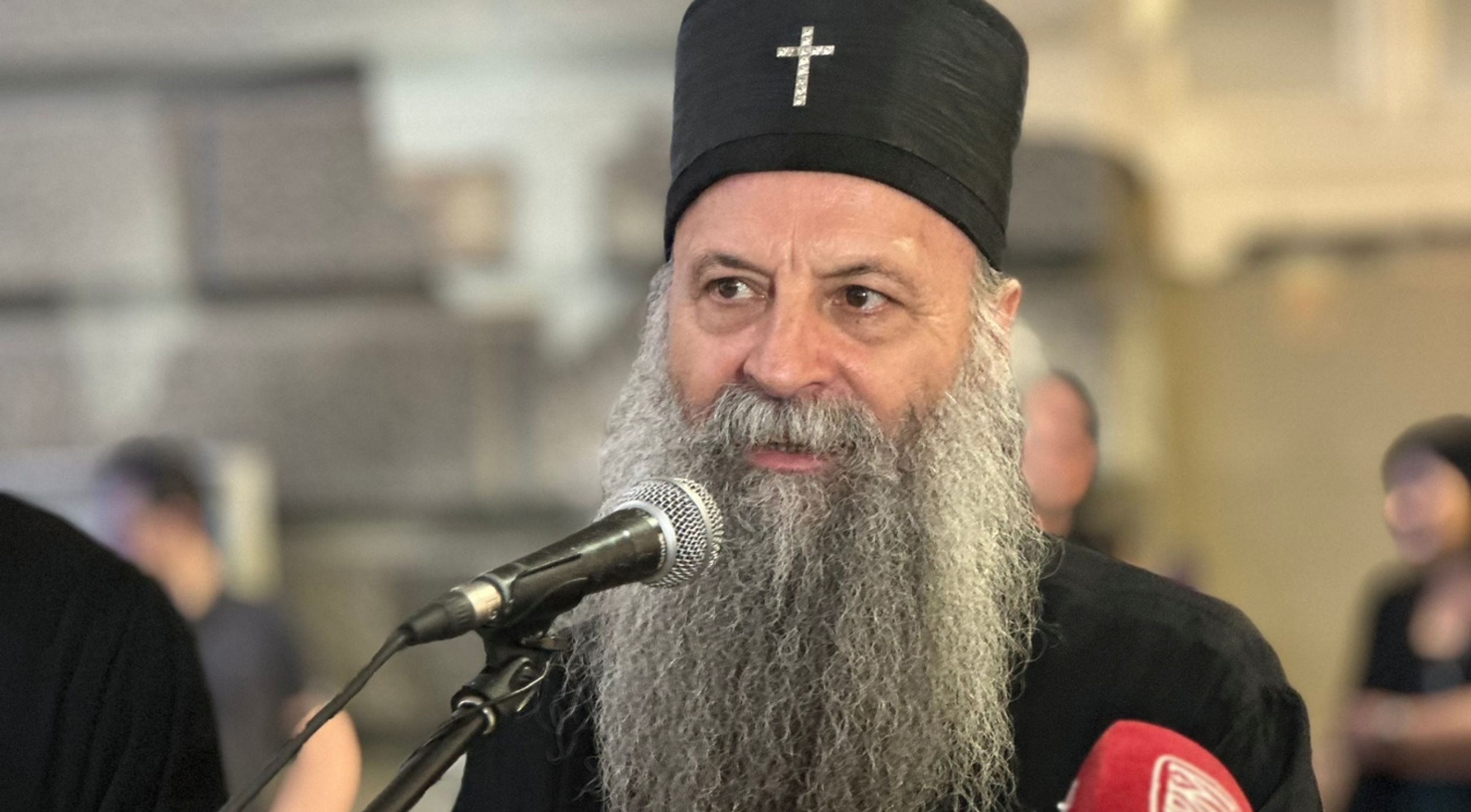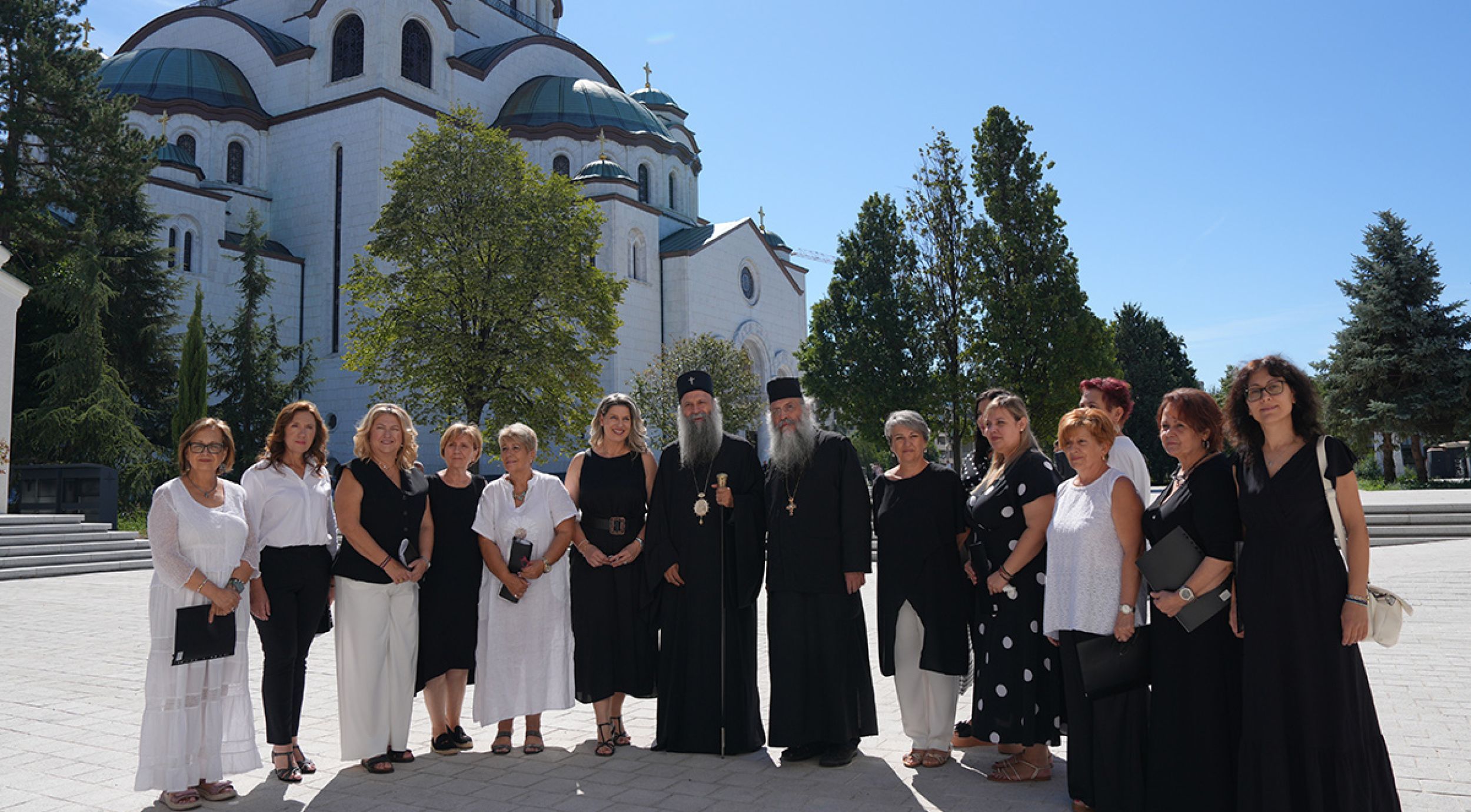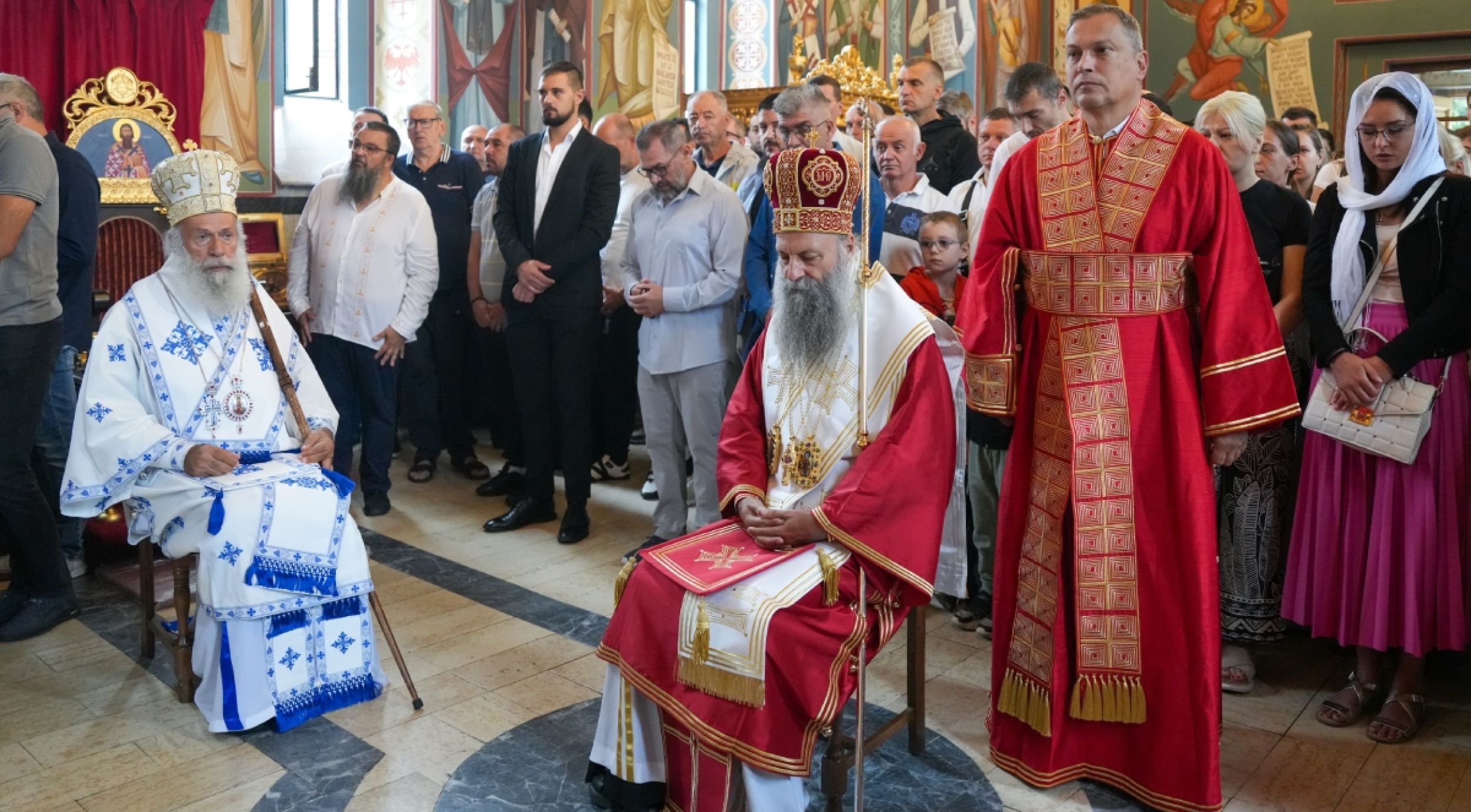Patriarch Porfirije: Divisions are the source of evil, and evil cannot bring forth good!
Address of His Holiness Serbian Patriarch kyr Porfirije, delivered on 15 September 2025, on the Serbian Flag, Unity, and Freedom Day, at the National Theater in Belgrade
Your Eminences, esteemed Mr. Prime Minister of the Republic of Serbia, esteemed Mr. Prime Minister of the Republic of Srpska, all of you in order and in honor, brothers and sisters, may this Serbian Flag, Unity, and Freedom Day be happy and blessed by God wherever we as a people may be found!
Reflecting on what message I should address tonight, first to myself and then to our entire people, I resolved to call upon all of us to prayerfully look toward our Holy Father Sava and to seek his help and instruction, to ask ourselves what is most important for us today. It is the right occasion for that, since this year we are marking 850 years since his birth. And I conclude that from his treasury of countless virtues, the most important is that he succeeded in gathering his children together in the unity of the Spirit – and not just any spirit, but the Holy Spirit.
It is a great truth that unity by origin, by blood, kin, name, land, homeland, language, is significant, and that every unity in any of these categories has its meaning. But far more important, or better said, fundamental, essential, and foundational, is spiritual unity among people. Saint Sava revealed to us and explained that this unity is reflected in a man’s sense of responsibility for another man; that it is founded upon our communion with God, for He, God, is the common Father of all people. That is why every person, regardless of race, nationality, class, or any other difference, is my brother or sister. In that awareness, we must bear in mind that the Lord continually addresses each of us personally, as once He did the unfortunate Cain, asking: Where is your brother? (Gen. 4:9). This radically moving question and this sobering Voice we must listen to attentively and constantly within ourselves, lest, God forbid, it be drowned out by the deafening noise of insults, humiliations, hatred, and contempt for our neighbor, whose dreadful waves, through social networks and on the streets of our cities, unrelentingly beat upon each of us. That question, which God Himself poses to each one of us personally, should remind us that, regardless of everything, we are obliged to care for our neighbor. And my immediate neighbor is the one placed by God so that through love toward him, every man becomes my neighbor: first, the one in my family, my relative, my neighbor, the member of my own people. Only through the struggle of love toward those immediate God-given neighbors do we become capable of seeing every human being, who is the image of God, as our neighbor.
We must, without delay, live this truth every day – live it in the faith of the Gospel of Christ, whose essence flows into the twofold commandment of love: first, the total love of God, and second – that we love our neighbor as ourselves. Only then will the joy, or peace, or struggle, or sorrow of my brother and sister be mine, just as everything that befalls me will be theirs. On this plane of thought, there arises the full, urgent depth contained in the New Testament words of the great Saint Apostle Paul: Now I beseech you, brethren, by the name of our Lord Jesus Christ, that ye all speak the same thing, and that there be no divisions among you; but that ye be perfectly joined together in the same mind and in the same judgment (1 Cor. 1:10). Thus wrote Saint Paul to the Christians of Corinth, and I dare to say and repeat the same to all of us, members of the Orthodox Serbian people, but also to the whole world. Divisions of every kind – by faith, nationality, education, wealth, social status, political programs, right or left, guilty or innocent – probably torment us today even more than they once did the Christians in Corinth. Every division, whatever it may be based upon, gives birth to every sort of evil, from envy to hatred, to enmity and discord. Divisions are the source of evil, and of them, the Christ-imbued mind of our people, through the mouth of the epic poet, said that evil cannot bring forth good!
The concept of freedom for us Serbians is founded on the words of Saint Apostle Paul – let us mention him once again – who calls every man with the words: Stand fast therefore in the liberty wherewith Christ hath made us free (Gal. 5:1). This is, first and foremost, an inner, spiritual freedom. Freedom from sin. Freedom from selfishness, self-love, and pride. Freedom to be devoted to Christ, to His irresistible love, and through Him – that is, through Christ – to be partakers in the final victory over the devil, over evil, and over death, our greatest threefold enemy. And what else can that mean except that we are to be bearers of the very source of freedom within ourselves? The founder and bearer of that freedom on the battlefield was our immortal Prince, the great-martyr of Kosovo, Lazar. Inspired by his free choice, our people throughout their mostly arduous history have fought for the freedom of human dignity, for the freedom of the nation, for the freedom of the land given by God, and for every other kind of freedom that is an unquestionable gift of God, and thus the inalienable possession of every man. Since freedom in Christ has no alternative, we know and confess that we must not and will not renounce it for anything.
Both unity in the Holy Spirit and freedom in Christ are inseparably bound in our Serbian flag, which boldly waves wherever we are and proclaims first to us, and then to others:
Red was the blood shed for freedom...
The blue sky as freedom, the ideal of the Serbian kin...
With white milk my dear mother nourished me...
One wreath, three are the colors, this is the Serbian tricolor:
red, blue, and white, that is the pride of all Serbdom!
And not only pride, but also an obligation to guard it before God, before our holy ancestors and descendants, as the most precious value and greatest gift, as the very apple of our eye.
Therefore, praying to the Lord that He may never deprive us, even when we falter, of the freedom with which He has made us free, and that we may always live, gathered in the unity of the Spirit, in love—strengthened and ordered by one another as in a powerful formation, good and spiritual and salvific, as our Holy Father Sava set forth in his Typikon—only then, and exclusively then, is there hope for us, there is a future for our baptized people. Only by such a principle of life will there be among us neither the presumptuously privileged on one side nor the despised and rejected on the other, but we shall be one, united, and blessed people of God, who are a friend to every man and every nation.
Your Eminences, esteemed Mr. Prime Minister of the Republic of Serbia, esteemed Mr. Prime Minister of the Republic of Srpska, all of you in order and in honor, brothers and sisters, may this Serbian Flag, Unity, and Freedom Day be happy and blessed by God wherever we as a people may be found!
Reflecting on what message I should address tonight, first to myself and then to our entire people, I resolved to call upon all of us to prayerfully look toward our Holy Father Sava and to seek his help and instruction, to ask ourselves what is most important for us today. It is the right occasion for that, since this year we are marking 850 years since his birth. And I conclude that from his treasury of countless virtues, the most important is that he succeeded in gathering his children together in the unity of the Spirit – and not just any spirit, but the Holy Spirit.
It is a great truth that unity by origin, by blood, kin, name, land, homeland, language, is significant, and that every unity in any of these categories has its meaning. But far more important, or better said, fundamental, essential, and foundational, is spiritual unity among people. Saint Sava revealed to us and explained that this unity is reflected in a man’s sense of responsibility for another man; that it is founded upon our communion with God, for He, God, is the common Father of all people. That is why every person, regardless of race, nationality, class, or any other difference, is my brother or sister. In that awareness, we must bear in mind that the Lord continually addresses each of us personally, as once He did the unfortunate Cain, asking: Where is your brother? (Gen. 4:9). This radically moving question and this sobering Voice we must listen to attentively and constantly within ourselves, lest, God forbid, it be drowned out by the deafening noise of insults, humiliations, hatred, and contempt for our neighbor, whose dreadful waves, through social networks and on the streets of our cities, unrelentingly beat upon each of us. That question, which God Himself poses to each one of us personally, should remind us that, regardless of everything, we are obliged to care for our neighbor. And my immediate neighbor is the one placed by God so that through love toward him, every man becomes my neighbor: first, the one in my family, my relative, my neighbor, the member of my own people. Only through the struggle of love toward those immediate God-given neighbors do we become capable of seeing every human being, who is the image of God, as our neighbor.
We must, without delay, live this truth every day – live it in the faith of the Gospel of Christ, whose essence flows into the twofold commandment of love: first, the total love of God, and second – that we love our neighbor as ourselves. Only then will the joy, or peace, or struggle, or sorrow of my brother and sister be mine, just as everything that befalls me will be theirs. On this plane of thought, there arises the full, urgent depth contained in the New Testament words of the great Saint Apostle Paul: Now I beseech you, brethren, by the name of our Lord Jesus Christ, that ye all speak the same thing, and that there be no divisions among you; but that ye be perfectly joined together in the same mind and in the same judgment (1 Cor. 1:10). Thus wrote Saint Paul to the Christians of Corinth, and I dare to say and repeat the same to all of us, members of the Orthodox Serbian people, but also to the whole world. Divisions of every kind – by faith, nationality, education, wealth, social status, political programs, right or left, guilty or innocent – probably torment us today even more than they once did the Christians in Corinth. Every division, whatever it may be based upon, gives birth to every sort of evil, from envy to hatred, to enmity and discord. Divisions are the source of evil, and of them, the Christ-imbued mind of our people, through the mouth of the epic poet, said that evil cannot bring forth good!
The concept of freedom for us Serbians is founded on the words of Saint Apostle Paul – let us mention him once again – who calls every man with the words: Stand fast therefore in the liberty wherewith Christ hath made us free (Gal. 5:1). This is, first and foremost, an inner, spiritual freedom. Freedom from sin. Freedom from selfishness, self-love, and pride. Freedom to be devoted to Christ, to His irresistible love, and through Him – that is, through Christ – to be partakers in the final victory over the devil, over evil, and over death, our greatest threefold enemy. And what else can that mean except that we are to be bearers of the very source of freedom within ourselves? The founder and bearer of that freedom on the battlefield was our immortal Prince, the great-martyr of Kosovo, Lazar. Inspired by his free choice, our people throughout their mostly arduous history have fought for the freedom of human dignity, for the freedom of the nation, for the freedom of the land given by God, and for every other kind of freedom that is an unquestionable gift of God, and thus the inalienable possession of every man. Since freedom in Christ has no alternative, we know and confess that we must not and will not renounce it for anything.
Both unity in the Holy Spirit and freedom in Christ are inseparably bound in our Serbian flag, which boldly waves wherever we are and proclaims first to us, and then to others:
Red was the blood shed for freedom...
The blue sky as freedom, the ideal of the Serbian kin...
With white milk my dear mother nourished me...
One wreath, three are the colors, this is the Serbian tricolor:
red, blue, and white, that is the pride of all Serbdom!
And not only pride, but also an obligation to guard it before God, before our holy ancestors and descendants, as the most precious value and greatest gift, as the very apple of our eye.
Therefore, praying to the Lord that He may never deprive us, even when we falter, of the freedom with which He has made us free, and that we may always live, gathered in the unity of the Spirit, in love—strengthened and ordered by one another as in a powerful formation, good and spiritual and salvific, as our Holy Father Sava set forth in his Typikon—only then, and exclusively then, is there hope for us, there is a future for our baptized people. Only by such a principle of life will there be among us neither the presumptuously privileged on one side nor the despised and rejected on the other, but we shall be one, united, and blessed people of God, who are a friend to every man and every nation.
Најновије вести
02.02.2026 19:15

